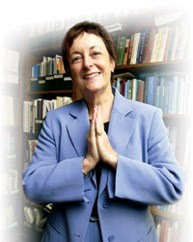
Old news, but I thought readers might be interested.
The ruling of the Iowa District Court in Varnum v. O'Brien, affirmed unanimously by the Iowa Supreme Court earlier this year, held that a ban on same-sex marriage was unconstitutional.
Counsel for Polk County, the defendant in the original lawsuit brought by six gay couples, called Margaret Somerville, the ethics guru from McGill University, as an expert witness against same-sex marriage. She was accompanied by a team of religion professors from the same university. The lower court, in rendering summary judgement (no actual trial took place), found that they weren't "experts" at all:
[T]he Court concludes that these individuals are not qualified to testify as experts regarding the issues in this matter. Though they may have expertise in certain areas, such expertise is insufficient to qualify Ms. Somerville, Dr.[Katherine] Young and Dr.[Paul] Nathanson to answer the particular questions that they are asked. Though these experts desire to make statements regarding gender, results of same-sex marriage on children and the universal definition of marriage, they do not appear to possess expertise in relevant fields such as sociology, child development, psychology or psychiatry. Ms. Somerville specifically eschews empirical research and methods of logical reasoning in favor of “moral intuition.” She has no training in empirical research and admits having no knowledge of existing social science research relevant to this case. She concedes that her views do not reflect the mainstream views of other ethicists. Dr. Young claims that she pulls together factors from many academic disciplines, including sociological, economic, political and religious factors, though she does not profess expertise in these areas. Nathanson indicates that his methodology involves observing “what people say about religion.” The views espoused by these individuals appear to be largely personal and not based on observations supported by scientific methodology or based on empirical research in any sense. They do not meet the criteria for the admission of expert testimony under the Iowa Supreme Court’s test in Leaf and certainly fail the more stringent test articulated by the United States Supreme Court in Daubert. [p.7]
Ouch.
Incidentally, as a superb example of plain-language common sense, the Supreme Court judgement is well worth reading in full. Here is how it demolishes the tired old "but, but...they can't procreate" argument:
Promotion of procreation. The County also proposes that government endorsement of traditional civil marriage will result in more procreation. It points out that procreation is important to the continuation of the human race, and opposite-sex couples accomplish this objective because procreation occurs naturally within this group. In contrast, the County points out, same-sex couples can procreate only through assisted reproductive techniques, and some same-sex couples may choose not to procreate. While heterosexual marriage does lead to procreation, the argument by the County fails to address the real issue in our required analysis of the objective: whether exclusion of gay and lesbian individuals from the institution of civil marriage will result in more procreation? If procreation is the true objective, then the proffered classification must work to achieve that objective.
Conceptually, the promotion of procreation as an objective of marriage is compatible with the inclusion of gays and lesbians within the definition of marriage. Gay and lesbian persons are capable of procreation. Thus, the sole conceivable avenue by which exclusion of gay and lesbian people from civil marriage could promote more procreation is if the unavailability of civil marriage for same-sex partners caused homosexual individuals to “become” heterosexual in order to procreate within the present traditional institution of civil marriage. The briefs, the record, our research, and common sense do not suggest such an outcome. Even if possibly true, the link between exclusion of gay and lesbian people from marriage and increased procreation is far too tenuous to withstand heightened scrutiny. Specifically, the statute is significantly under-inclusive with respect to the objective of increasing procreation because it does not include a variety of groups that do not procreate for reasons such as age, physical disability, or choice. In other words, the classification is not substantially related to the asserted legislative purpose. [pp.59-60]
Do I detect just a hint of humour here?


